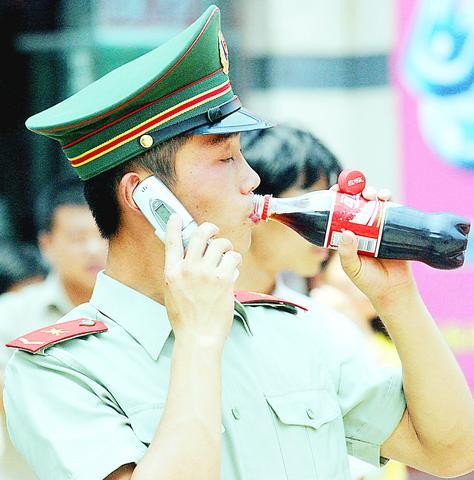China's military staged its first parade in Hong Kong yesterday, with 3,000 soldiers marching crisply in formation as others rode in armored vehicles and helicopters, as part of efforts by Beijing to boost patriotism and soothe lingering political tensions.
The People's Liberation Army (PLA) invited all of Hong Kong's pro-democracy lawmakers to the event at a barracks on the outskirts of town, and those who attended said they were impressed.

PHOTO: AP
"They are very well-trained and disciplined and leave us with a lasting impression," said Hong Kong's top opposition party leader, Yeung Sum (
Beijing's move was seen as a conciliatory gesture to politicians it viewed as troublemakers -- some of whom were barred from entering China -- but also one with a bit of a barb because the pro-democracy figures would seem a bit out of place standing at attention to watch the PLA march past.
LONG SHADOW
The pro-democracy figures hold annual candlelight vigils commemorating the deaths of hundreds if not thousands of unarmed people in a PLA crackdown on pro-democracy activists in Beijing in 1989.
Despite Beijing's apparent goodwill gesture, Yeung didn't think it was a breakthrough.
"This is just a ceremony and not real communication," Yeung said, adding that they didn't have a chance to talk with mainland officials at the event.
Yeung said he hopes the opposition can visit Beijing and discuss democracy with Chinese leaders after September's legislative elections.
Yesterday, the Chinese soldiers -- decked out in neat green uniforms and carrying rifles -- marched to mark the 77th anniversary of the PLA, which won control of China for Mao Zedong's (
The army has maintained a presence here since Britain handed Hong Kong back to China on July 1, 1997, but its troops generally stay in their barracks and keep an extremely low profile.
Their arrival seven years ago was greeted with suspicion by many Hong Kong people, who were shocked by the use of tanks and troops against the Tiananmen Square pro-democracy movement in Beijing on June 4, 1989.
Still, yesterday's parade generated intense interest in Hong Kong. Cable TV reported that people began lining up before dawn to get a good vantage point.
Chinese officials say they staged the parade to enhance the relationship between the army and Hong Kong's people.
The parade "displays the army's strength and determination to maintain Hong Kong's prosperity and stability," said Wang Jitang, commander of the PLA's Hong Kong garrison.
ELECTION FEARS
But it comes at a time when the Hong Kong and Beijing governments fear the outcome of September elections in which ordinary people will directly choose 30 of 60 legislative seats.
The voters are expected to side overwhelmingly with anti-government and pro-democracy candidates, which could spell political trouble for Chief Executive Tung Chee-hwa (
Hong Kong people are unhappy with Tung, who was picked by a pro-Beijing committee, but China ruled in April that residents cannot democratically choose his successor in 2007 or all lawmakers in 2008.

AIR SUPPORT: The Ministry of National Defense thanked the US for the delivery, adding that it was an indicator of the White House’s commitment to the Taiwan Relations Act Deputy Minister of National Defense Po Horng-huei (柏鴻輝) and Representative to the US Alexander Yui on Friday attended a delivery ceremony for the first of Taiwan’s long-awaited 66 F-16C/D Block 70 jets at a Lockheed Martin Corp factory in Greenville, South Carolina. “We are so proud to be the global home of the F-16 and to support Taiwan’s air defense capabilities,” US Representative William Timmons wrote on X, alongside a photograph of Taiwanese and US officials at the event. The F-16C/D Block 70 jets Taiwan ordered have the same capabilities as aircraft that had been upgraded to F-16Vs. The batch of Lockheed Martin

GRIDLOCK: The National Fire Agency’s Special Search and Rescue team is on standby to travel to the countries to help out with the rescue effort A powerful earthquake rocked Myanmar and neighboring Thailand yesterday, killing at least three people in Bangkok and burying dozens when a high-rise building under construction collapsed. Footage shared on social media from Myanmar’s second-largest city showed widespread destruction, raising fears that many were trapped under the rubble or killed. The magnitude 7.7 earthquake, with an epicenter near Mandalay in Myanmar, struck at midday and was followed by a strong magnitude 6.4 aftershock. The extent of death, injury and destruction — especially in Myanmar, which is embroiled in a civil war and where information is tightly controlled at the best of times —

China's military today said it began joint army, navy and rocket force exercises around Taiwan to "serve as a stern warning and powerful deterrent against Taiwanese independence," calling President William Lai (賴清德) a "parasite." The exercises come after Lai called Beijing a "foreign hostile force" last month. More than 10 Chinese military ships approached close to Taiwan's 24 nautical mile (44.4km) contiguous zone this morning and Taiwan sent its own warships to respond, two senior Taiwanese officials said. Taiwan has not yet detected any live fire by the Chinese military so far, one of the officials said. The drills took place after US Secretary

THUGGISH BEHAVIOR: Encouraging people to report independence supporters is another intimidation tactic that threatens cross-strait peace, the state department said China setting up an online system for reporting “Taiwanese independence” advocates is an “irresponsible and reprehensible” act, a US government spokesperson said on Friday. “China’s call for private individuals to report on alleged ‘persecution or suppression’ by supposed ‘Taiwan independence henchmen and accomplices’ is irresponsible and reprehensible,” an unnamed US Department of State spokesperson told the Central News Agency in an e-mail. The move is part of Beijing’s “intimidation campaign” against Taiwan and its supporters, and is “threatening free speech around the world, destabilizing the Indo-Pacific region, and deliberately eroding the cross-strait status quo,” the spokesperson said. The Chinese Communist Party’s “threats